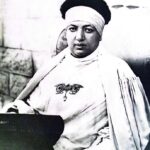KHAMA, SERETSE
- 3 Min Read
Seretse Khama (July 1, 1921-July 13 1980) was a center of a political storm in 1950 when the British Government exiled him from the Bechuanaland protectorate (now Botswana) because of his marriage to a young English woman. Eventually he became president of an independent Botswana, was knighted by Queen Elizabeth II and, through wise and pragmatic leadership, demonstrated that a non- racial democracy could exist in Southern Africa, an area of bitter racial confrontation.
Grandson of Khama III, also known as Khama the Great, and a son of Sekgoma II, Seretse, on his father’s death in 1925, inherited the chieftainship of the Bamangwato, the largest tribe in the protectorate, while his uncle, Tshekedi Khama, became regent. Educated in South Africa at Lovedale and at Fort Hare College, he graduated with a bachelor of arts degree. After a year at the University of the Witwatersrand, he postponed the responsibilities of chieftainship and went to Oxford for a year, then to the Inner Temple in London to study law. There in 1948 he married Ruth Williams, sparking off a controversy which divided the tribe and became a matter of international concern when the British government exiled him. After years of protest, his return was negotiated in 1956.
With his wife he settled in Serowe and, having renounced claims to the chieftainship, with his uncle and other leaders he took part in working for political reforms. Having led the founding of the Botswana Democratic Party, he was elected prime minister in 1965-66. When Botswana gained independence on September 30, 1966, with Gaborone as the capital, he became president of the Republic which remained in the Commonwealth.
Botswana, exceptionally poor, was inevitably economically independent on neighbouring South Africa and Rhodesia, whose fascist policies were anathema to President Khama and his government. With the development of mineral resources and the encouragement of modern ranching techniques, the country the size of France with a population of less than a million became more prosperous and its multi-party democracy was almost unique in Africa.
Deliberate, humorous, honest, tolerant, Seretse Khama was angered by corruption and amused by pomposity. “We see our development,” he said in 1970, “as a viable, united, non-racial democracy, as a contribution the only one we can make towards progress to majority rule and self-determination throughout Africa.” For his services to refugees he was awarded the Nansen medal. He appointed one refugee, a distinguished leader of the African National Congress (ANC) of South Africa, Dr. Z. K. Matthews, as Botswana’s first ambassador to the United Nations.
Mindful of Botswana’s extreme vulnerability to its powerful white-dominated neighbours, he refused to allow freedom fighters to operate from there, but said: “We can no more condemn those who resort to violence to gain freedom… than we could condemn the violence of European resistance movements against German occupation or the violence of the Hungarians against the Russians in 1956.” Despite this vulnerability and his own deteriorating health, he was active in the Front Line States summit negotiations which led to Zimbabwe’s independence and aimed to promote that of Namibia. As president Nyerere of Tanzania said, he was “in the forefront of every attempt to achieve peace in Southern Africa… on the basis of freedom.”
President Khama was chancellor of the University of Botswana, was awarded an honorary doctorate by Fordham University in New York, and was made an honorary Fellow of Balliol College, Oxford.
MARY BENSON




